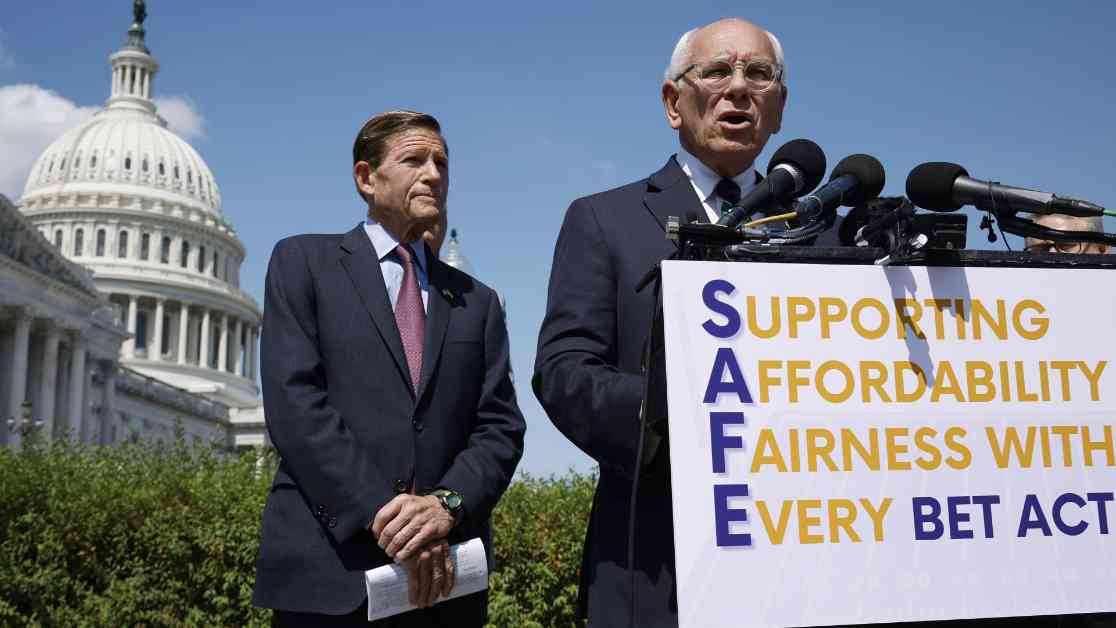Sports betting has seen a massive surge in popularity in the United States over the past few years, prompting lawmakers to take action to regulate the industry. Rep. Paul Tonko from New York and Sen. Richard Blumenthal from Connecticut have introduced the Supporting Affordability and Fairness with Every Bet (SAFE Bet) Act to establish federal regulations for sports betting operators. The goal of this legislation is to ensure that these operators adhere to minimum federal standards and address the public health implications associated with the growing trend of sports betting.
The Supreme Court decision in 2018 to overturn the federal ban on sports betting paved the way for its legalization in 38 states across the country. With the industry experiencing exponential growth, it generated a record $11 billion in revenue in 2023, marking a 44% increase from the previous year as reported by the American Gaming Association. This influx of revenue has also been a boon for states, which benefit from taxes imposed on sports betting activities.
However, the rapid expansion of the sports betting industry has raised concerns about the potential risks associated with gambling addiction. Rep. Tonko emphasized the need for Congress to intervene, stating that the relationship between the gambling industry and sports has become dangerously pervasive. He highlighted the omnipresence of sports betting advertisements on various platforms, from social media to billboards, and the impact it has on individuals vulnerable to developing gambling problems.
At a press conference, Gordon Douglas shared a personal account of his son’s struggles with gambling addiction, shedding light on the devastating effects it can have on individuals and their families. Douglas recounted how his son, a former athlete and coach, fell into a spiral of compulsive gambling after signing up with a gambling company and being bombarded with promotional offers from multiple operators. The situation became so dire that his son contemplated ending his life as a result of the overwhelming financial burden caused by his gambling habits.
The Douglas family’s story is not unique, as statistics show that an estimated 7 million Americans struggle with gambling addiction, with a significant portion of them resorting to suicidal thoughts. The National Institutes of Health and National Council on Problem Gambling have reported alarming rates of bankruptcy filings in states where sports betting is legal, indicating a correlation between gambling activities and financial ruin for some individuals.
The introduction of the SAFE Bet Act by Rep. Tonko and Sen. Blumenthal aims to address these pressing issues by establishing a national standard for regulating sports betting. The legislation focuses on three key areas: advertising, affordability, and artificial intelligence. By imposing restrictions on the use of AI to track players’ gambling behavior and limiting the frequency of customer deposits, the bill seeks to promote responsible gambling practices and protect vulnerable individuals from falling into the trap of addiction.
Rep. Blumenthal emphasized the need for stringent regulations to curb the exploitative tactics employed by the gambling industry, likening their strategies to those used by the tobacco industry in the past. He underscored the importance of safeguarding public health and ensuring that sports betting remains a safe and enjoyable recreational activity for all participants.
Despite the intentions behind the SAFE Bet Act, the legislation has faced opposition from some quarters, including Rep. Dina Titus from Nevada, who criticized it as outdated and unwarranted. Chris Cylke, the senior vice president of government relations at the American Gaming Association, defended the industry’s contributions to state economies and consumer protection efforts, arguing that the bill undermines the progress made in regulating sports wagering operations.
As the debate over the regulation of sports betting continues, it is essential to consider the broader implications of unchecked growth in the industry. While sports betting can offer entertainment and economic benefits, it also poses significant risks to individuals susceptible to gambling addiction. By implementing comprehensive regulations and oversight measures, lawmakers can strike a balance between promoting responsible gambling practices and safeguarding public health.
In conclusion, the introduction of the SAFE Bet Act represents a significant step towards establishing federal regulations for sports betting operators in the United States. By addressing key areas such as advertising, affordability, and artificial intelligence, the legislation seeks to promote responsible gambling practices and protect individuals from the harmful effects of gambling addiction. As the industry continues to evolve, it is crucial for lawmakers to prioritize the well-being of consumers and ensure that sports betting remains a safe and enjoyable activity for all participants.






















